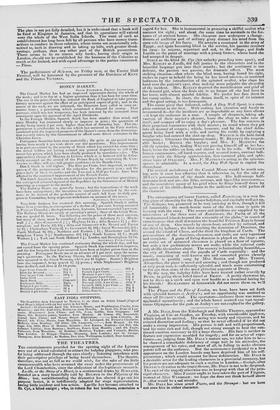THE THEATRES.
THE entertainments provided for the opening night of the Lyceum were not of a kind calculated to attract the holyday playgoers, who prefer being addressed through the eyes chiefly; listening interferes with their prescriptive privilege of being heard themselves. The theatre, therefore, was not so full as we could wish, for the sake of the little commonwealth who have assumed the sway under the protectorate of the Lord Chamberlain, since the abdication of the legitimate monarch. Lucille, or the Story of a Heart, is a sentimental drama by Bratsaitn, founded on a story beautifully told by BULWER in the Pilgrims of the Rhine; but, notwithstanding the dramatist has altered it ro suit his purpose better, it is indifferently adapted for stage representation, having little incident and less action. Lucille has become attached to St. Cyr, a blind emigre; who, in return for her kindness, entertains a regird for her. She is instrumental in procuring a skilful oculist who • restores his sight ; and about the same time he succeeds to the fortunes of an ancient house. His elmeacter now undergoes a change : dreams of ambition and of military glory distract his mind from the once tole image of his fancy. Ile accepts a command in the army of Egypt ; and again becoming blind in the service, his passion resumes its sway: he returns, repentant and sad, to the village ; and finds Lucille on the point of marriage with a young farmer, whose hand she had accepted in despair. SERLE as the blind St. Cyr (his unlucky preaching tone apart), and Mrs. KEELEY as Lucille, did full justice to the characters and to the beautiful language put into their mouths ; but the sentiment is too delicate, the passion too passive, for dramatic effect. The most striking situation—that where the blind man, having found his sight, rushes in eager to behold the being he has loved unseen—is rendered ludicrous by the introduction of the agitated oculist, who claps his hand over the patient's eyes, thus making more palpable the absurdity of the incident. Mrs. KEELEY depicted the mortification and grief of the devoted girl, when she finds she is no longer all she had been to her lover, with almost painful fidelity. We prefer her face drest in her sunny smiles. In short, the drama itself, in spite of its interest and the good acting, is too larmoyante. The comic piece that followed, called A Day I Fell Spent, is a complete contrast to the first. With nothing but situation and bustle to recommend it—for the incidents are as improbable as any farce allows —it kept the audience in a roar. A couple of shopmen, taking advantage of their master's absence, leave the shop to take care of itself, and scamper off to enjoy a day's pleasure. The fun consists in their perpetual rencontres with their master ; to avoid whom they get into all manner of scrapes ; which, however, end by the chief delinquent being fixed with a wife, and saving his credit by capturing a burglar who bad entered the shut-up shop. WRENCH is the bold-faced scapegrace ; OXBERRY the timorous truant ; W. BENNETT the respectable hosier; Itomlin the burglar; and Mrs. F. MaTusws the elderly spinster, who, finding WRENCH passing himself off as her husband, turns the tables on hini, and claims to be his wife. WRENCH'S brazen countenance, off-hand manner, and assured tones, contrast ludicrouNly svith the fidgety apprehension, fear-tortured phiz, and split. straw voice of Oxuratev. Mrs. F. MaTnews's acting as the spinster. spouse is admirable. In a word, the Day I Veil Spent is capital fun throughout.
The revived melodrama of the Cornish Miners would be worth seeing, were it even less effective than it otherwise is, for the sake of IsN's personation of the dumb maniac. His half-savage halfdemoniac look and air—his lithe, nervous, and tiger-like movements— and the convulsive agony of his grief when he flings himself down by the grave of his child—bring home to the audience the wild pathos of the character.


























 Previous page
Previous page